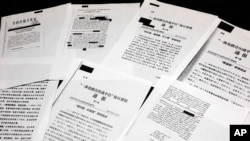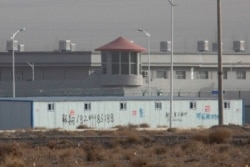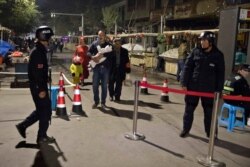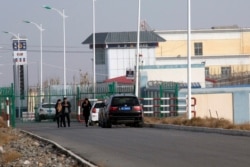A new leak of classified Chinese government documents has revealed how authorities are using a massive data collection program to target and detain an estimated one million ethnic minority Muslims in the country's Xinjiang province.
The trove of documents, which was obtained and published by the International Consortium of Investigative Journalists (ICIJ), revealed the blueprints and tactics behind an intensifying campaign of intrusive surveillance, political and cultural indoctrination against Uighurs, Kazakhs and other Muslim ethnic groups in Xinjiang.
Rights groups have warned for years that China is systematically oppressing Uighurs and eradicating their culture and religious beliefs, and the new documents detail how authorities have pursued ideological "re-education" for an entire population.
Uighurs and other Muslim minorities imprisoned inside the camps are scored based on how well they speak the dominant Mandarin and follow rigorous rules from bathing to using the toilet. Scores determine if they can leave.
The leaked internal documents and communications were obtained and published on Sunday.
This followed the leak of 400 pages of internal documents to The New York Times last week.
"We're in 2019 and we've got over a million people in concentration camps in Xinjiang," White House National Security Adviser Robert O'Brien said Saturday at an international security conference in Halifax. "That's an outrage."
"Those camps should be closed. They should be dismantled," added O'Brien.
"But it's not just the camps. It's the surveillance infrastructure that's been built in the region tracking people through facial recognition, A.I., through electronic means. They've created an entire surveillance state in that province."
China response
Chinese authorities have justified the extreme measures as necessary to counter what they claim to be "terrorism" and to ensure China's national security.
Monday, Chinese Foreign Ministry spokesperson Geng Shuang refuted the new document leak, saying issues surrounding Uighur Muslims are "purely China's internal affairs."
"Certain media are trying to smear China's counterterrorism and de-radicalization efforts in Xinjiang by despicably hyping up Xinjiang-related issues, but their attempts will not succeed. Stability, ethnic solidarity and harmony in Xinjiang are the best responses to such disinformation," said Geng.
Visa restrictions
Last month, the U.S. State Department announced visa restrictions on Chinese government and Communist Party officials believed to be responsible for, or complicit in, the detention or abuse of Uighurs, Kazakhs, or other Muslim minority groups in Xinjiang.
While no specific names of Chinese officials were mentioned, U.S. officials and congressional members had said President Donald Trump's administration was considering sanctions against officials linked to the abuses on Muslims, including Xinjiang Party Secretary Chen Quanguo.
"If China has nothing to hide, it should allow truly independent human rights monitors immediate and unfettered access to Xinjiang — something it has steadfastly refused to do so far, despite repeated requests from Amnesty International and others," the rights group's campaign director for East Asia, Lisa Tassi, said in a statement Monday.







